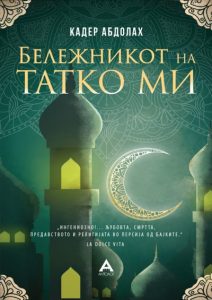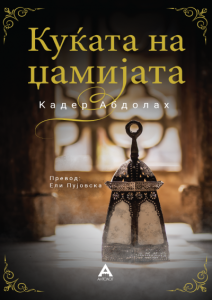 KADER ABDOLAH
KADER ABDOLAH
Netherlands
Kader Abdolah (1954) is an Iranian writer who also writes in the Dutch language. His real name is Hossein Sajadi Gemagami Farahani. He secretly studied Western literature and understood the concept of freedom in a completely different way. As a physics student in Tehran, he wrote for a left-wing underground newspaper, and secretly published two collections of short stories under the pseudonym Kader Abdollah. He made his debut on the Dutch literary scene in 1993. Abdullah's works have been translated into twenty languages.
 My father's notebook
My father's notebook
Translation: Elizabeta Bozhinoska
When he was a child, Agha Akbar, the unrecognized son of a Persian nobleman, traveled with his uncle to the depths of Persia, which hid a mysterious cave. In it was a relief carved with cuneiform script, three thousand years old, from the time of the first Persian king. To get rid of what he felt, little Agha Akbar created his own script from these symbols, with which he passionately wrote about his life, about his family, about emotions and about the social changes that were happening in his country. He created a personal diary that only he could understand
Years later, his son Ishmael lives as a political dissident in exile. Trying to decipher the inherited notebook, he tells not only his father's fate as a village carpet repairer but also his story as a political activist in conflict with the authorities in the country he was born in, but also the story of 20th century Iran. And none of these stories can leave anyone indifferent. A breathtakingly ambitious novel about a culture's journey to modernity and a wondrous and timeless chronicle of a son's eternal love for his father.
 The house of the mosque
The house of the mosque
Translation: Eli Pujovska
Alef Lam Miembegins the Arabic alphabet, with the belief that, correctly combined, these letters reveal the secrets of the universe. Thus begins The House of the Mosque, an impressive book about the human spirit's desire to conquer. Welcome to the house of the mosque.
Iran, 1969. Spring arrives, and while the women prepare for the holidays, Sedik waits for the suitor to knock on the door. Her uncle Nosrat returns from Tehran with a glamorous woman, and Shahbal longs for a TV to watch the moon landing. But no one can predict what will happen. Household experiences great love and loss as it opens doors to faith and politics.
The House of the Mosque explores the way of life of a traditional Iranian family and how it copes with Western-influenced changes, revolution and subsequent radicalization. In addition, the book depicts the struggles of the bazaar, the religious rule of the imams, and the internal family divisions of traditionalists and revolutionaries.
This sublime bestseller describes the triumphs and tragedies of a family on the brink of revolution. At the end of the novel, their world is turned upside down.
Abdolah flies through fiction and through history on a "magic carpet", intertwining the intoxicatingness of the Orient with the horrific reality that Agha Jan's family faces.
The novel, like Fellini's camera, takes the reader through a series of vignettes of small-town life that draw attention to the big picture (feminism, the tension between institutional religion, power, and popular faith) without ever sounding like a history or sociology lesson. Fascinating and distinctive. A measured and powerful example of literary resistance.
